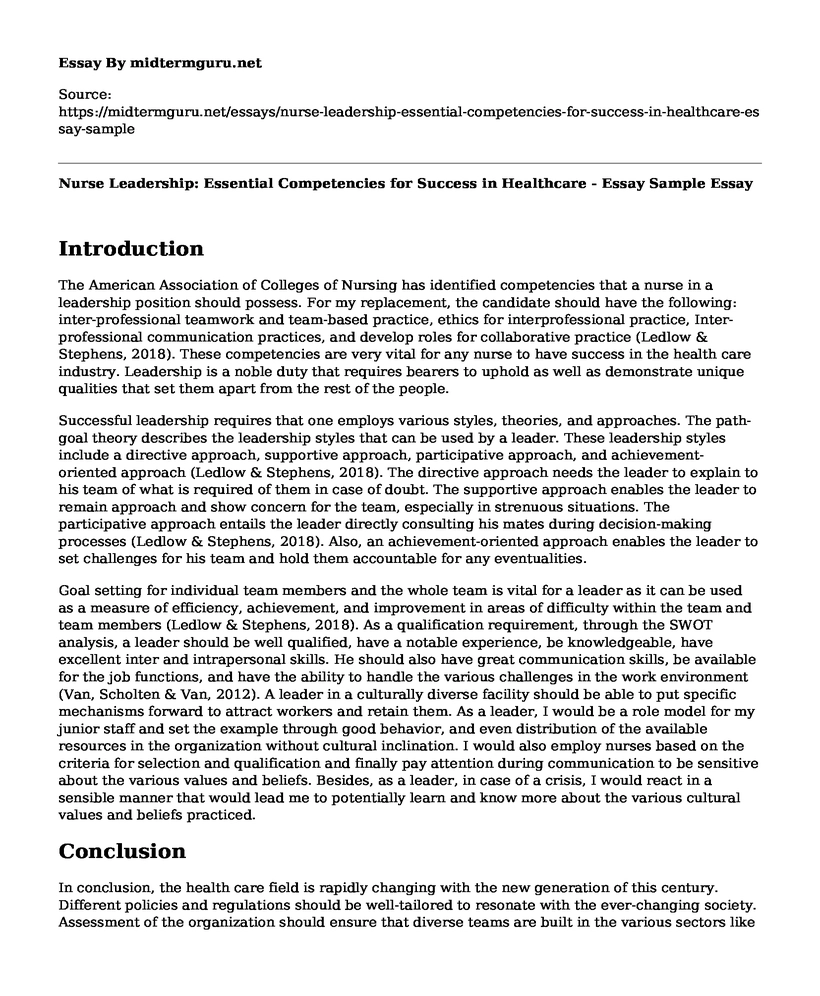Introduction
The American Association of Colleges of Nursing has identified competencies that a nurse in a leadership position should possess. For my replacement, the candidate should have the following: inter-professional teamwork and team-based practice, ethics for interprofessional practice, Inter-professional communication practices, and develop roles for collaborative practice (Ledlow & Stephens, 2018). These competencies are very vital for any nurse to have success in the health care industry. Leadership is a noble duty that requires bearers to uphold as well as demonstrate unique qualities that set them apart from the rest of the people.
Successful leadership requires that one employs various styles, theories, and approaches. The path-goal theory describes the leadership styles that can be used by a leader. These leadership styles include a directive approach, supportive approach, participative approach, and achievement-oriented approach (Ledlow & Stephens, 2018). The directive approach needs the leader to explain to his team of what is required of them in case of doubt. The supportive approach enables the leader to remain approach and show concern for the team, especially in strenuous situations. The participative approach entails the leader directly consulting his mates during decision-making processes (Ledlow & Stephens, 2018). Also, an achievement-oriented approach enables the leader to set challenges for his team and hold them accountable for any eventualities.
Goal setting for individual team members and the whole team is vital for a leader as it can be used as a measure of efficiency, achievement, and improvement in areas of difficulty within the team and team members (Ledlow & Stephens, 2018). As a qualification requirement, through the SWOT analysis, a leader should be well qualified, have a notable experience, be knowledgeable, have excellent inter and intrapersonal skills. He should also have great communication skills, be available for the job functions, and have the ability to handle the various challenges in the work environment (Van, Scholten & Van, 2012). A leader in a culturally diverse facility should be able to put specific mechanisms forward to attract workers and retain them. As a leader, I would be a role model for my junior staff and set the example through good behavior, and even distribution of the available resources in the organization without cultural inclination. I would also employ nurses based on the criteria for selection and qualification and finally pay attention during communication to be sensitive about the various values and beliefs. Besides, as a leader, in case of a crisis, I would react in a sensible manner that would lead me to potentially learn and know more about the various cultural values and beliefs practiced.
Conclusion
In conclusion, the health care field is rapidly changing with the new generation of this century. Different policies and regulations should be well-tailored to resonate with the ever-changing society. Assessment of the organization should ensure that diverse teams are built in the various sectors like leaderships, management, science, and research but still be rooted in the foundation values and mission of the organization. Also, leaders should increase their competency and make decisions basing on the situations at hand compared to using the predetermined set of rules and regulations. This will be great in enticing more people into getting into the nursing career, especially for this current generation. Based on the above leadership requirements and styles, my replacement should be able to dedicate themselves and take the organization to greater heights.
References
Ledlow, G. R., & Stephens, J. H. (2018). Leadership for health professionals: Theory, skills, and applications. Burlington, MA: Jones & Bartlett Learning.
Van Wijngaarden, J. D., Scholten, G. R., & van Wijk, K. P. (2012). Strategic analysis for health care organizations: the suitability of the SWOTanalysis. The International Journal of health planning and management, 27(1), 34-49. https://www.ncbi.nlm.nih.gov/pubmed/20603842
Cite this page
Nurse Leadership: Essential Competencies for Success in Healthcare - Essay Sample. (2023, Jan 29). Retrieved from https://midtermguru.com/essays/nurse-leadership-essential-competencies-for-success-in-healthcare-essay-sample
If you are the original author of this essay and no longer wish to have it published on the midtermguru.com website, please click below to request its removal:
- How Does Ageism and Stereotypes Associated With Ageism Qualify as a Form of Prejudice
- Essay on Personal Health Assessment
- Essay on Qualities of an Educational Leader
- Essay Sample on Intrinsic Motivation
- Essay Sample on Pneumonia
- Nurse Leadership: Essential Competencies for Success in Healthcare - Essay Sample
- Reflective Essay on Volunteering







